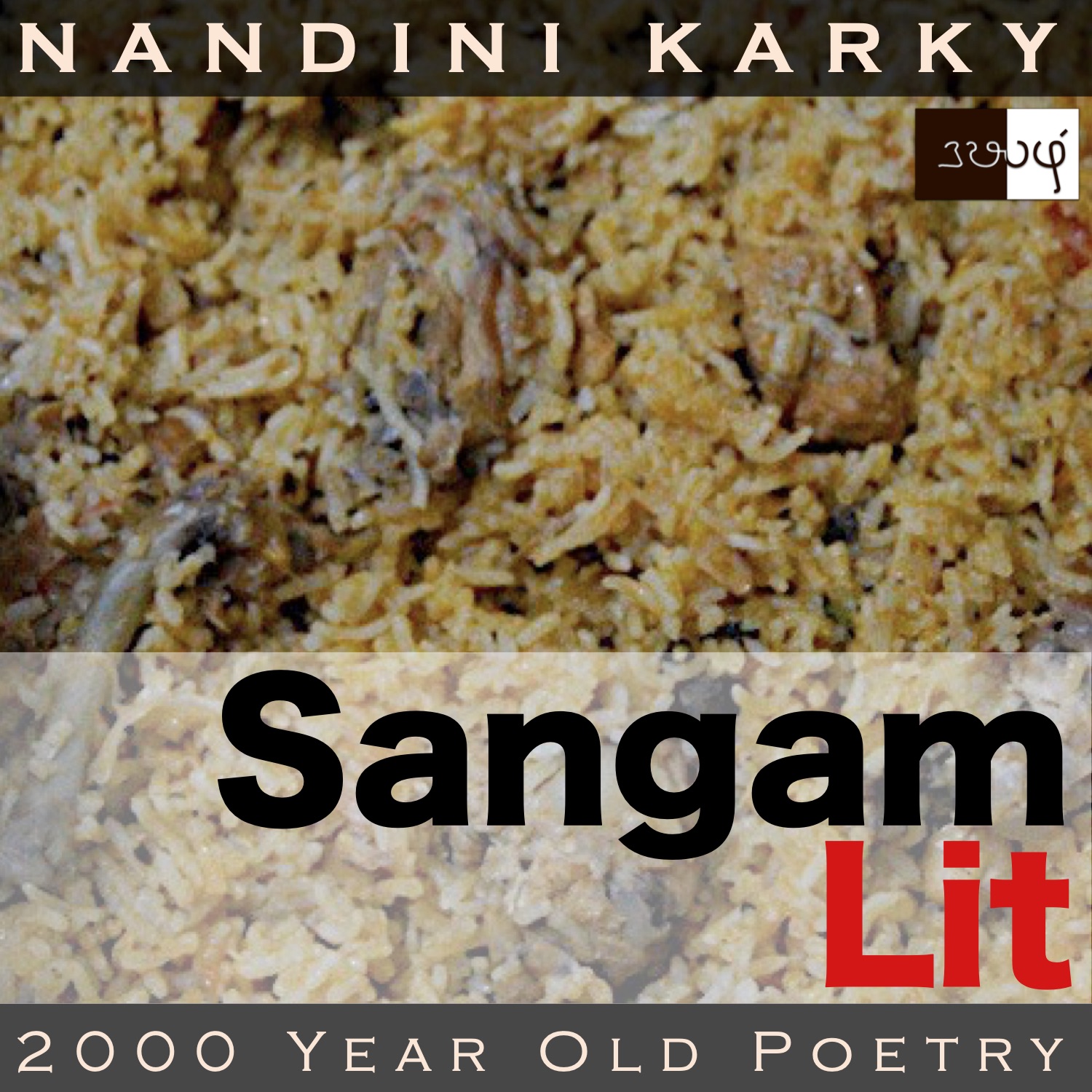Podcast: Play in new window | Download
Subscribe: Apple Podcasts | Spotify | Amazon Music | Android | iHeartRadio | TuneIn | RSS | More

In this episode, we marvel at the poetic feast spread out in Sangam Literary work, Natrinai 83, written by Perunthevanaar. The poem is set in the ‘Kurinji’ landscape of mountain country and speaks in the voice of the confidante to an owl, passing on a hidden message to the man listening nearby.
எம் ஊர் வாயில் உண்துறைத் தடைஇய
கடவுள் முது மரத்து, உடன் உறை பழகிய,
தேயா வளை வாய், தெண் கண், கூர் உகிர்,
வாய்ப் பறை அசாஅம், வலி முந்து கூகை!
மை ஊன் தெரிந்த நெய் வெண் புழுக்கல்,
எலி வான் சூட்டொடு, மலியப் பேணுதும்;
எஞ்சாக் கொள்கை எம் காதலர் வரல் நசைஇத்
துஞ்சாது அலமரு பொழுதின்,
அஞ்சு வரக் கடுங் குரல் பயிற்றாதீமே.
The poem opens like a hero introduction song, the hero in question being a ‘கூகை’ or an owl! Where he lives, how he looks and what he does is presented in this peppy number. The expression ‘தேயா வளை வாய்’ meaning ‘not-blunt, curved beak’ is interesting because a positive word ‘sharp’ is presented as the absence of its negative. Maybe to avoid repetition, the poem does not simply say ‘கூர்’ or ‘sharp’ for the beak too, for following shortly, it details the ‘கூர் உகிர்’ meaning ‘sharp claws’! I’m sure articles many have been written about the legendary eye-sight of the owls and here, the poem abstracts it with the rhythmic expression ‘தெண் கண்’ meaning ‘clear eyes’. As the final salute to our feathered hero, it’s referred to as a ‘வலி முந்து கூகை’ meaning ‘owl brimming with strength!’ Behold, you can see its six-pack already! Then, the poem makes a turn towards the kitchen talking about ‘மை ஊன்’ which means ‘goat’s meat’ and ‘புழுக்கல்’ meaning ‘cooked rice’. Taking a whiff of all that’s cooking in this verse, let’s move on to meet the meat of the poetic matter!
The man arrives for his nightly tryst with the lady. Knowing that the man is in earshot, the confidante, as if speaking to the owl, says, “In an ancient god-dwelling tree by the pond, near the entrance to our village, you reside, O owl! You are the one so strong, with a sharp, curved beak, clear vision, sharp claws and a terrifying call like that of a drum beat! I shall offer in plenty, ghee cooked rice filled with goat’s meat and roasted rat’s white flesh, if only you will abstain from resounding your harsh voice that sends fear shivers during that time when the lady lies awake, awaiting her man, who walks on with determination and love to meet her!” With these words, the confidante passes on the hidden message to the man that his tryst with the lady is filled with the danger of discovery and that indeed it was time to turn his attention towards seeking a wedded union with the lady.
Like a gourmet, let’s dwell on the many layers of this poetic feast! First stop, the home of the owl. The poem describes this to be a wide-girthed tree by the village pond. In all probability, it’s a banyan. The phrase ‘கடவுள் முது மரம்’ to describe the tree meaning ‘god’s ancient tree’ tells us that people of yore believed that gods and spirits lived in trees. With that casual reference as if mentioning the apartment name of our feathered hero, the poem informs us about how nature and divinity lived together in the minds of ancient people. The whole poem centres on the resounding call of the owl. Perhaps years of human domination have changed bird calls, for I was not able to find one on the web that could possibly send shivers down the spine. Mostly, the owl calls seemed to be that of screeches and hoots. However, some owls are described as having a ‘deep, resonant call’ and perhaps, in those days, the owls were bold enough to speak so loud. In any case, the confidante equates the owl’s cry to that of a terrifying drum beat. Then, she comes to the point, requesting the said owl to hold its tongue, so as to not wake the whole town, scaring the man and the lady who are to meet. The confidante asks the owl not to do what it does, by not addressing to its good heart but rather with an incentive! And what an incentive…
The confidante declares that she will offer mounds of ghee cooked rice, mixed with goat’s meat! Sounds familiar? Indeed, it’s the Sangam-style biriyani! Not just that, understanding that the rat is a preferred item on an owl’s menu, the confidante also offers to roast a rat and offer its white flesh! Wonder if the owl was tempted and zipped its sharp beak! I’m amused to know that this concept of offering biriyani as a bribe seems to extend as far as two thousand years ago! Kidding apart, the confidante knows that no matter the incentive, the owl will be itself and do what it will. The whole speech is just to convey to the man that such dangers await their tryst and that he should be thinking of seeking the lady’s hand in marriage. A toast to long-term solutions rather than short-lived pleasures!




Share your thoughts...